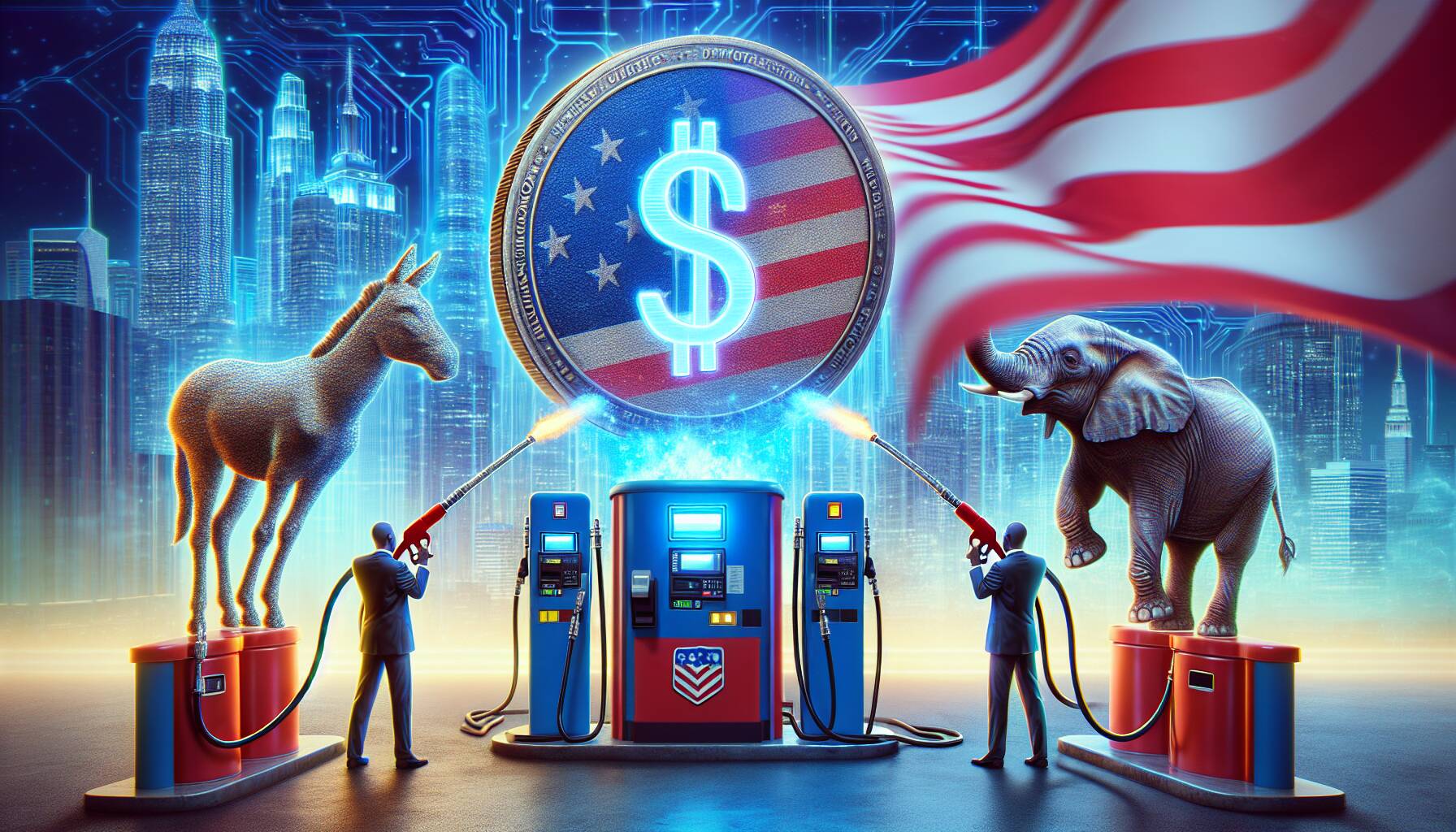The cryptocurrency landscape in the United States is undergoing a significant transformation, marked by an unusual wave of bipartisan support. Recently, U.S. lawmakers made headlines by voting to overturn an Internal Revenue Service (IRS) rule that would have imposed strict tax reporting requirements on decentralized finance (DeFi) projects. These votes, which passed with substantial margins in both the Senate and House, indicate a growing momentum within Congress that has crypto lobbyists watching with hopeful anticipation. The bipartisan alignment—bringing together 19 Senate Democrats and 76 House Democrats to align with their Republican counterparts—is a notable shift for an industry that faced considerable skepticism just a few years prior.
“For years, we’ve been playing defense — trying to protect the industry from hostile regulators,” said Kristin Smith, CEO of the Blockchain Association, highlighting the newfound confidence among crypto advocates.
This noteworthy shift comes in the wake of substantial financial efforts in the electoral arena, with the industry-backed Fairshake political action committee investing heavily to support pro-crypto candidates across party lines. As Congress prepared for votes this past week, it seemed evident that legislators are now recognizing the political advantages of supporting a burgeoning industry that increasingly plays a role in the American economy. Backed by significant financial resources, such as the over 6 million that Fairshake has raised for continued political action, the relationship between crypto interests and lawmakers appears to be evolving toward collaboration rather than confrontation.
The focus is now shifting toward developing clearer regulations that govern the cryptocurrency and stablecoin markets, areas that are pivotal for businesses and consumers alike. With bipartisan cooperation seeming more achievable than in the past, lawmakers are ready to tackle proposals that could establish a more definitive legal framework for digital assets. As the industry hopes for what could be a landmark piece of legislation, many are buoyed by the understanding that their advocacy efforts have begun to bear fruit, paving the way for a more favorable operating environment.
“There’s tremendous political benefit in supporting the growth and smart regulation of the industry,” said Josh Vlasto, a spokesman for Fairshake, reflecting the dynamic adjustments in political calculus surrounding cryptocurrencies.

U.S. Crypto Lobbyists Celebrate Legislative Gains
Recent developments indicate a significant shift in the U.S. Congress regarding cryptocurrency regulation, highlighting increasing bipartisan support for the industry. Here are key points to consider:
- Bipartisan Congressional Support
- Recent votes in both the House and Senate showcased strong bipartisan backing for crypto-friendly legislation.
- Significant support came from Democrats, indicating a shift in the party’s attitude towards cryptocurrency.
- IRS Rule Rejected
- Congress successfully voted to overturn an IRS rule that could have imposed extensive reporting requirements on decentralized finance (DeFi) projects.
- This rejection reflects growing legislative support for a less restrictive approach to crypto innovation.
- Focus on Stablecoin Legislation
- Legislation governing U.S. stablecoin issuers is nearing completion, suggesting timely regulatory frameworks are in development.
- The outcome may provide more stability and clarity for the growing stablecoin market, impacting businesses and consumers alike.
- Long-Term Regulatory Clarity
- Legislation aimed at establishing clear regulations for crypto trading and transactions is being prioritized.
- Clear regulations could reduce legal uncertainties, making it easier for businesses and consumers to engage with crypto assets.
- Political Funding Influence
- Fairshake political action committee’s financial backing has significantly influenced pro-crypto lawmakers’ elections.
- Political support through financial incentives may encourage lawmakers to prioritize cryptocurrency-friendly policies.
- Increased Public Interest
- The rise in public experience with cryptocurrencies and the demand for regulation may drive further legislative advancements.
- Consumer awareness and interest in crypto could affect market dynamics and regulatory landscapes in the coming years.
“There’s tremendous political benefit in supporting the growth and smart regulation of the industry.” – Josh Vlasto, Fairshake spokesman
The Growing Influence of Crypto Lobbyists in U.S. Politics
In a significant turning point for the cryptocurrency sector, recent congressional votes have showcased an unexpected coalition supporting digital assets. Traditionally viewed with skepticism, the crypto industry now finds itself with influential allies from both major political parties. This is akin to the surprising surge in bipartisan support seen for legislation addressing major societal issues, showcasing how crypto has positioned itself as a uniting force in a divided Congress.
Competitive Advantages: The crypto lobby has successfully transformed its narrative from an underdog facing regulatory hurdles to a powerful entity with significant backing. Their ability to rally support across party lines, particularly with 19 Senate Democrats and 76 House Democrats breaking from their party line, illustrates a broader acceptance of the crypto industry’s potential. This newfound strength is likely to translate into substantial regulatory advancements, especially around stablecoins and digital asset trading. By engaging a diverse coalition of lawmakers, the crypto lobby has positioned itself to wield considerable influence in shaping a robust regulatory framework.
Competitive Disadvantages: However, this optimism is not without its challenges. The same bipartisanship that empowers crypto advocates could also inspire dissenting voices who fear the implications of deregulated markets, especially in issues like anti-money laundering or consumer protection. As the crypto lobby continues to push for favorable legislation, they may risk provoking a backlash from more skeptical politicians and constituencies concerned about financial oversight and the protection of investors. Additionally, with an increasing number of political groups targeting crypto businesses, any misstep in legislative negotiations could prompt a shift in public sentiment, potentially stalling progress.
This dynamic presents a dual-edged sword. On one hand, pro-crypto policies could significantly benefit start-ups, investors, and the broader U.S. economy by fostering innovation. On the other hand, aggressive lobbying efforts and the financially motivated assistance from entities like the Fairshake PAC could alienate more moderate lawmakers and invite greater scrutiny on the industry’s practices. As legislation progresses, this could either solidify a favorable operating environment or lead to unforeseen regulatory constraints.
Moreover, as lawmakers turn their attention to crafting comprehensive crypto regulations, they have an opportunity to strike a balance between innovation and accountability. If done poorly, however, it could result in an increasingly fragmented market, where only the most established players thrive while new participants face overwhelming barriers to entry. Thus, as powerful entities like Coinbase and Ripple Labs continue their lobbying efforts, they must tread carefully—balancing ambition with responsibility to mitigate the risk of regulatory pushback.

















